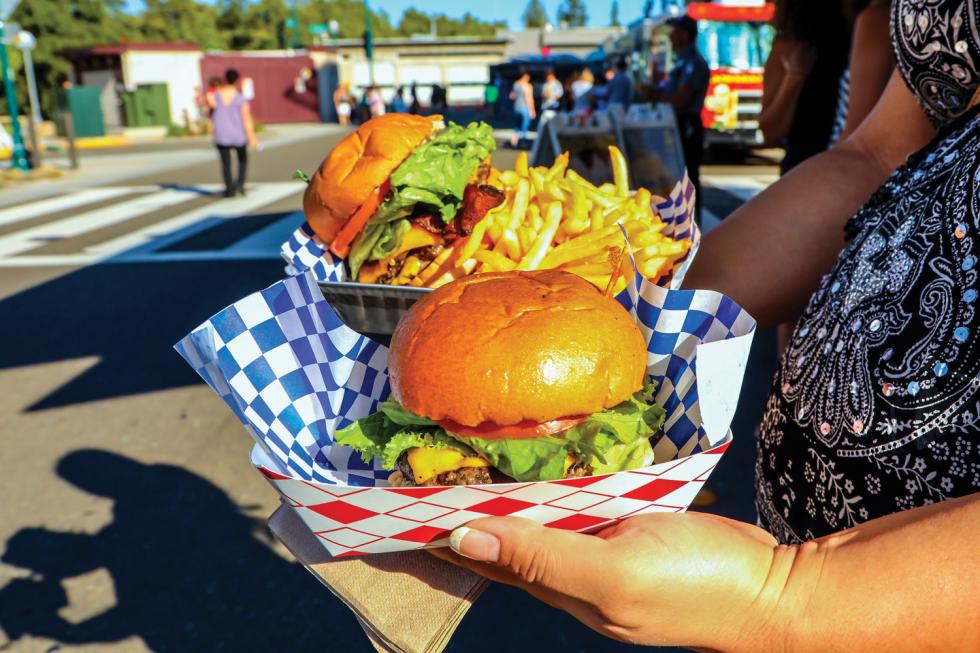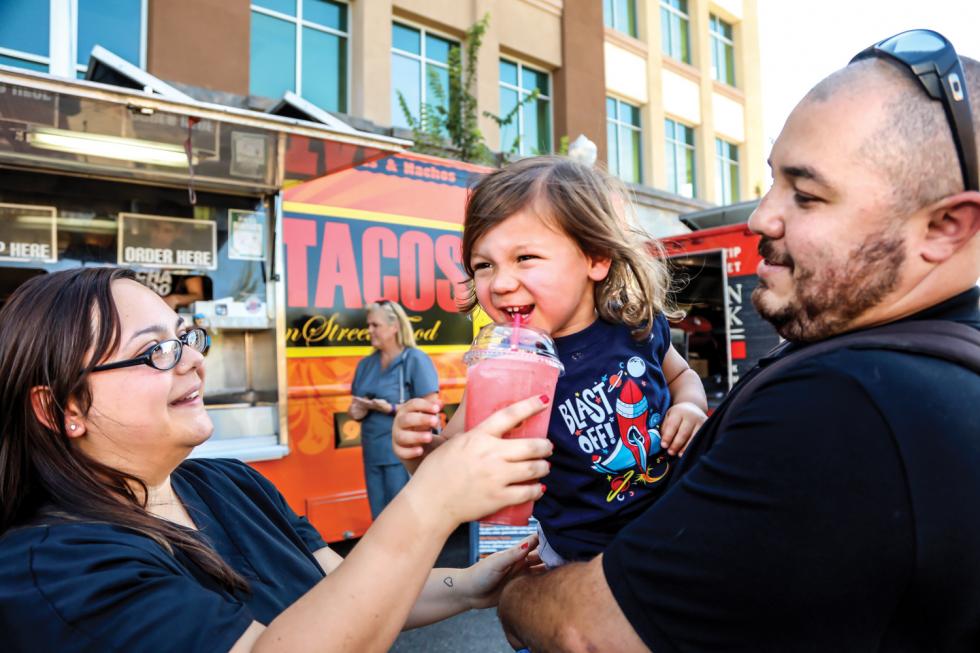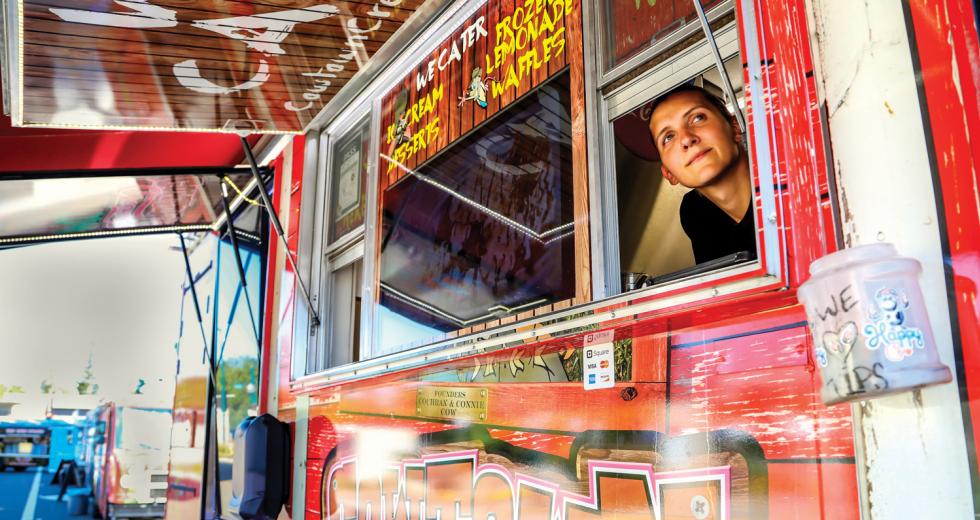SactoMoFo, which had held regular events over the years that opened the door for food trucks in Sacramento, hosted its 10th and final central city gathering at the Railyards on April 29.
The event that activated an industry in 2011 with a dozen trucks — back then the only food trucks in town — held its swan song in a downtown sector the city is trying to activate. Was the irony lost?
Now an estimated 60-plus trucks in the greater Sacramento region serve the gamut of on-the-go meals: from boba to burgers, pizza to papaya, curry to cupcakes. SactoMoFo isn’t shuttering, but making a financial decision to focus on events in cities that don’t require redundant permitting and fees to operate: cities like Elk Grove, Roseville, West Sacramento, Rancho Murieta, Folsom and Rancho Cordova — basically anywhere but Sacramento. Founder Paul Somerhausen’s outlook is that the city now has enough cultural cache that it simply doesn’t need to clear a path for food trucks.
“The barrier of entry is a lot higher here than it is in other cities,” Somerhausen says. “The smaller communities will try harder because they want the culture, they want the trends. The City of Sacramento has so many choices and options already that they don’t have to worry about one more project. Stuff will happen anyway.”
Burgers from GameDay at Food Truck Mania.

This has led to two trends in the region. The first is SactoMoFo — still the big tuna in the regional food truck scene — focusing its outreach in smaller communities where city officials are encouraging and helpful. The second is interest in the Sacramento market from the Bay Area. Just across the Tower Bridge along the West Sacramento river walk promenade, San Francisco-based Off The Grid at The Barn is in its second year, holding a weekly food truck event with interactive art and live music. “We’re literally off the grid,” says Off The Grid Vice President of Operations Stephanie Kuo of this location.
Founded in 2010, the events group organizes street food vendor experiences around Northern California, and is staking out territory around the region, seemingly dodging Sacramento except for Thursday appearances at the Sacramento Zoo. They also hold events at Prospect Park in Rancho Cordova, the Folsom Outlets and downtown Roseville.
“Sacramento has a lot of stuff to keep you guys busy,” Kuo says. “We’re trying to figure out how we fit in that.” For Off The Grid, it’s been about turning the isolated structure known as The Barn into a destination that services their target demographic, which Kuo says are young families and people with dogs. “We’re placing an emphasis on entertainment this year at The Barn,” she says. “Throughout the season we’re going to bring different types of activations. The art scene in Sacramento is really booming and we want to be able to showcase some of that.”
“Food trucks have thrived regardless of the government road bumps. There’s been so much public demand. Could it be better? Of course it could be better.” Paul Somerhausen, founder, SactoMoFo
West Sacramento’s accommodating practices extend beyond the encouragement of creative events and activations. Yolo County is one of the few counties that allows reciprocity, in which they honor the Sacramento County permit for food trucks, provided the business has no major violations, and reduce the permit cost to $250. Again, this clears a path for emerging culture and small business.
“Food trucks have thrived regardless of the government road bumps,” Somerhausen says. “There’s been so much public demand. Could it be better? Of course it could be better.”
To Somerhausen, better looks like fewer permits and fees. In order for a food truck to operate it must obtain a permit with the county to confirm it meets health codes. The permits typically cost around $600. Becoming a successful mobile business means holding permits for several counties beyond Sacramento, like Placer and Amador or Bay Area counties like San Francisco and Alameda. The permits make operators eligible for major events and pods of small two-to-five truck congregations that are more financially alluring than solo parking in high-population density districts for lunch rushes or late night pop-ups.
Stephanie and Mike Carr give 2-year-old Michael a taste of
strawberry lemonade at Food Truck Mania in Roseville.

Keith Breedlove, owner of the Culinerdy Cruzer food truck based in Elk Grove, says events like Off The Grid and partnerships with wineries and breweries in suburban areas carry greater financial appeal than being downtown as the bars let out — which may be contrary to popular belief.
“There’s no business downtown,” Breedlove says. “We do better business on the outskirts. Better business at breweries in West Sacramento or the wineries in Clarksburg. The places where there’s not a density of services to provide.”
Poll: Who needs food trucks more — the suburbs or the central city?
However Somerhausen’s opinion contrasts with Breedlove’s when it comes to nightlife districts. “I think nightlife is a huge gap for food trucks,” he says. “There’s not a lot of restaurants that are open after hours and yet they’ve made it practically impossible to operate in the nightlife districts.”
Both men worked on the updates to the mobile food ordinance with the Sacramento City Council in 2015 as part of a committee. Breedlove’s Culinerdy Cruzer truck is celebrating its five-year anniversary in September. He’s been here since the boom and witnessed the dust settle. While the ordinance lifted absurd regulations like 30-minute parking limits and allows trucks to be at a 50-feet distance from restaurants with outdoor seating areas, the regulations around additional fees still continue to harm mobile vendors.
Related: Driving authentic brand development in a crowded mobile food scene
According to the vendors, City of Sacramento is one of the few cities in the U.S. that requires a second permit to operate a food truck, one they describe as “redundant” and a “nuisance.” It’s a special business permit that requests brake and light inspections by the City and the police department. Once completed it totals an additional $600 over the county permit fee. The City is not done though. If trucks want to establish a pod, it requires more paperwork and more fees. Two trucks may assemble for $2,500 — any more than two and the cost doubles. Somerhausen also says that in his experience the permits take roughly six months to process, which is the sort of timeline that could bankrupt a truck before it ever has an opportunity to light the grill.
“To just put five trucks together you don’t need a permit in most places outside of the city of Sacramento,” he says. “If it’s an ongoing thing, there’s fees for every time you’re at a certain place. Most cities there’s no such requirements.”
Currently SactoMoFo limits its downtown pods to two trucks outside of Sutter Hospital at 15th Street and Capitol Avenue for lunch. Both are run with weekday regularity. The resentment from truck owners over excessive fees and permits means Sacramento continues to miss the boat with food trucks, while the evolution of the scene continues to grow on the outskirts of the city with more events and Bay Area interest.
Take SactoMoFo’s partnership with the City of Roseville, which shuts down Grant and Vernon Streets twice a month for Food Truck Mania. The event is promoted and embraced by the City as a way to establish the downtown as a stronger community focal point. Roseville Public Information Officer Brian Jacobson writes in an email that the popularity of the food truck events impacted more downtown events like concerts and family festivals. “The food trucks continue to be a staple,” Jacobson writes. “Even when our food truck events are held in the rain or heat, people are still lined up.”
Who needs the food trucks more — the suburbs or the central city? Tweet us @comstocksmag



